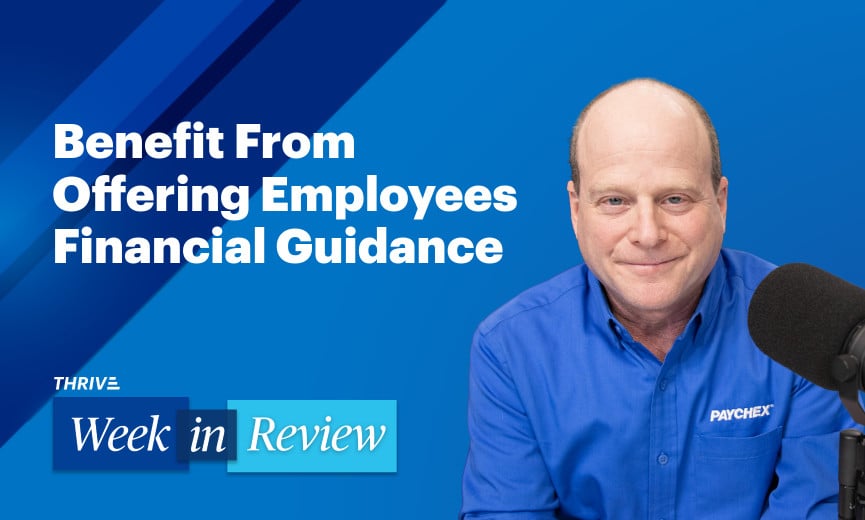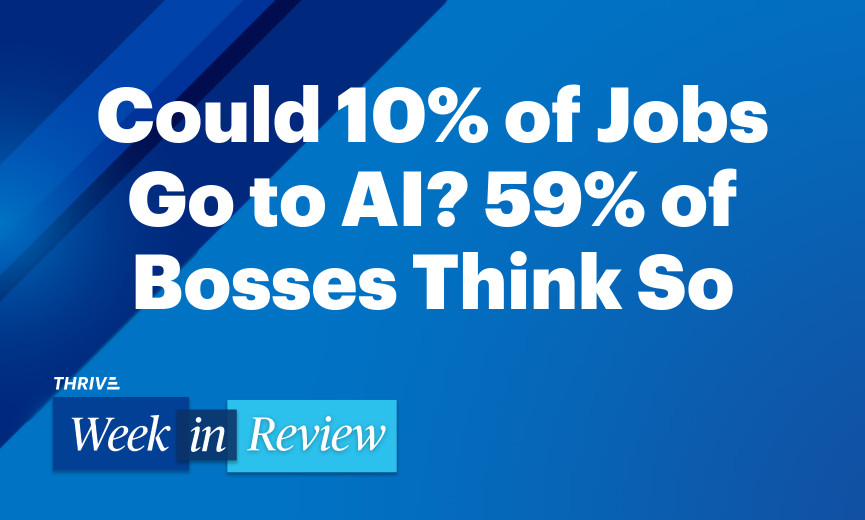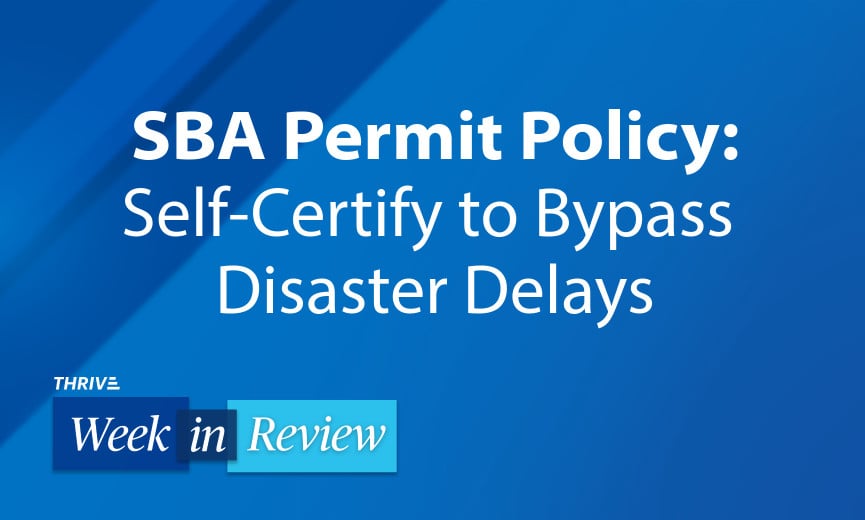- Thrive
-
Season
4Episode152
Hourly Earnings Growth Increases, Credit Card Usage Up, Employees Prefer Small Businesses
Podcast •
Watch
Summary
The Paychex Small Business Employment Watch delivers some good news from April with an increase in hourly earnings growth. Gene Marks points out a few other high points from the data in this week’s episode. He also notes that credit card usage by small businesses has increased but sees the trend as a response to the lack of loan accessibility and high interest rates, and doesn’t think using credit cards is bad for business. Plus, a survey shows that more employees prefer working for small businesses and Gene shares thoughts on why that is.
View Transcript
[Gene Marks, host]
Hey everybody, it's Gene Marks, and welcome to this week's episode of the Paychex Week in Review podcast, a THRIVE Podcast. Thanks so much for joining me. This is the podcast where we take a look at a few items of news that impacts your business and mine and I discuss a little bit about those items in the news. Okay.
By the way, before we get started, please remember if you need any help or tips or, want to get some, you know, prior issues of this podcast that you can link to go to our Paychex newsletter. Go to paychex.com/thrive and you can sign up for our Paychex newsletter there and get all the stuff that will keep you up to date and informed and help you run your business.
Okay, so let's go to the news. This month, of course, Paychex has released their most-recent version of their Small Business Employment Watch, and let me give you some of the highlights from there. According to Paychex, hourly earnings growth increased slightly to 3.34%, which ended a nearly two-year trend of deceleration, and jobs growth slowed in April. U.S. small businesses with fewer than 50 employees continued to add jobs, but at a slower pace, with the Small Business Jobs Index standing at a little bit over 100.
John Gibson, who is Paychex president and CEO, said this. “Our jobs index remains over 100, indicating continued year-over-year employment growth, yet the pace of growth has slowed. Demand for qualified workers continues to outweigh supply, which may be forcing employers to consider offering higher wages to attract and retain talent.”
A couple other highlights just so you know, I mentioned that those earnings growth were 3.34%. So, that's good news. The rate of small business job growth decelerated across all industries in April, though education and health services remained one of the strongest sectors for job growth.
And finally, for the sixth consecutive month, construction led the growth sectors in hourly earnings. That was a 3.85% increase in hourly earnings and weekly earnings, and weekly hours worked, as well.
So, what's the takeaway? First of all, I don't think that deceleration in jobs growth is something to be alarmed about. Unemployment is still at historic lows. There are still a lot of jobs openings out there. Businesses are being a little bit more cautious with their hiring, but again, I'm not seeing any panic signs about that. I do like the earnings. The fact that the construction industry alone is at 3.85% and hourly earnings is at 3.34%, that is keeping up with inflation right now, which is good. In fact, it might even be slightly above inflation depending on the factor that you're looking at.
So, to me, that's fairly good news. we are keeping up with the cost of living and, job growth, although it's moderated slightly, is still, you know, in not bad shape. So, not so bad news from Paychex this month.
The next bit of news comes from FOXBusiness.com and it has to do with small businesses and credit card usage. Small businesses, FOX News reports, are increasingly turning to credit cards as a key source of funding as they continue to grapple with still high inflation and rising borrowing costs. New findings that were published by Bank of America show that small businesses are reacting to inflationary pressures by relying more on credit cards to finance their debt.
Since 2019, small business credit card balances are up 18%, according to Bank of America's data. So, you would think that is an issue, but the analysts at Bank of America are not as concerned as you think they might be. According to the analysts, they say that the “ratio of total bank loans, which include credit card loans and net worth for non-financial, non-corporate businesses, most of which are small, remains at historically low levels. In our view,” according to the analysts, “the overall balance sheet conditions are therefore relatively healthy for small businesses.”
So, the takeaway there: Credit card balances are going up. More businesses are using credit cards, which doesn't surprise me because as interest rates have risen, it's getting tougher and tougher to get at least traditional bank loans, so people are turning to credit cards. But credit is still very widely available and the amount of credit that businesses are taking out still, according to Bank of America, is still at historically low levels.
So, we're not in any like, dangerous situation yet. Obviously, we keep an eye on that data to see if it starts getting into more problems. But right now, small businesses using a little bit more credit card debt, but not going overboard with using it.
So, but if you are using – just a one comment – obviously, you want to try and avoid credit card debt. Having said that, though, I'm actually a fan of using credit cards wherever possible. You know, if you use credit cards and you use them the right way, which means you pay them off that month or even after 1 or 2 months – I mean, that 18% interest rate on credit cards, that's an annual rate. If the return on investment of using a credit card because you need the money to purchase something internationally or to put down a, you know, a deposit for, you know, for a lease or, or to use it to buy a piece of equipment or something like that, I get it, you're going to be paying a little bit higher rate of interest. But for the very, very short term, if you can judge the return on investment, I don't think credit cards are a bad option at all. And that credit is, you know, very much available for small businesses.
So, I wouldn't turn away from credit cards. And by the way, by using credit cards, you get a lot of points and other awards that – or even discounts that they offer that might also benefit you, as well. So, again, the fact that we're using more credit cards, I don't think it's a big deal. We're certainly not in any kind of danger zone, according to Bank of America, and I always tell my clients, credit cards are not such a bad thing if they're used the right way.
Finally, a report in on new … sorry, from Morningstar. Morningstar has reported on a report from the UKG Workforce Institute about employees. Ready? Seventy-four (74) percent of American employees would prefer to work for a smaller business over a larger business. About three-quarters of employed Americans report that if all things are equal – compensation, benefits, hours, etc. – they would rather work for a smaller business than a larger business. This is from a new study, again from the UKG Workforce Institute.
However, 67% of employed Americans believe it is harder for smaller businesses to hire talent, which may be explained by the fact that nearly four out of five U.S. workers – 78% – say a larger business can afford higher wages. So, you've got all these people that want to work for a smaller business, but they don't. They don’t have the opportunity to do it because smaller businesses don't offer the same type of wages and benefits.
A few other pieces of data from this same report that might be of interest to you:
- 38% of employed Americans think that overall job satisfaction is better at smaller businesses, compared with just 17% who say it's better at larger businesses.
- 36% of employed Americans believe that there is greater schedule flexibility at smaller businesses.
So, here's my advice. I have always said, and I have always written, that it is much better to work at a small business than a large business. Most businesses that I talk to you say, well, how can we attract employees when we can't pay them that much? I go to so many clients of mine that have had workers working there for years, for years with low turnover, even though those same workers know darn well that they could leave that small business and work for some corporation down the street and probably make more money.
It's not all about money. It is about flexibility. It's about the people that you're working with and around. It's about the workplace culture that you're in, as well. It's about the chance to do something better and feel like you're actually making a difference, and the opportunity to work for the owners of the business and actually have a say in how the business is going and what it's doing. Those things are really, really important to a lot of people, even more so than just compensation.
So, keep that in mind when you're recruiting new employees. I know I do. If you were, you know, we know that almost three-quarters of employees would rather be working for us. So, why can't we sell our businesses a little bit better? Like, hey, yeah, your salary won't be as high, but here is all the other benefits that you are getting. I think if we do a better job selling all the benefits of working for a small business, I think small businesses would be able to attract and recruit even more people than we're doing right now.
So, thank you so much for joining me. My name is Gene marks. You have been watching and listening to the THRIVE Week in Review podcast. If you need any advice or tips again, or if you would like to join us for, you know, other podcast episodes you'd like to see, you can sign up for our Paychex newsletter. It's paychex.com/thrive. Again, thanks for watching and listening. We'll see you again next week. Take care.
This podcast is property of Paychex, Incorporated 2024. All rights reserved.

 Apple Podcast
Apple Podcast Spotify
Spotify iHeartRadio
iHeartRadio









